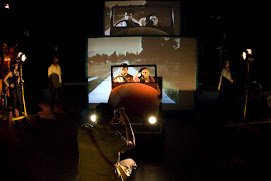We’re all familiar with Australian Idol, and in Britain, reality TV has done the same for playwrights and wannabe opera singers as well. Scanning the newspapers last weekend, I read about the State Library of NSW’s contest for poets and aspiring poets. Enter their 2007 Poetry Slam and you could win $10,000. ABC Radio was also advertising last week for entries in its short story competition for regional writers. (10 first prizes of $700 + broadcast.) And that got me thinking about competitions for new writing in general, and the implications of this recent proliferation: Have we developed a prize-based model of arts funding? Has a ‘hit-and-run’ culture in which one winner is rewarded for weeks or months of endeavour, while any number of others are not, crept in to replace the steady development of new work across various fronts?
The Sydney Theatre Company, when asked what it does to support new and local writing, invariably cites its Patrick White Playwrights’ Award—by far the largest cash reward for an unproduced play in Australia, but by no means the only contest for such scripts. Under the heading of ‘Fellowships’ Arts NSW runs an annual competition for historians, translators and writers. Glance at the ‘opportunities’ section of any writers’ organisation e-newsletter, and what you’ll see is essentially a list of competitions.
The accepted wisdom is that contests bring talented unknowns out of the woodwork. That’s the positive spin. The negative is that companies, broadcasters, producers and publishers get to tick the ‘new work’ box without having to pledge commitment. So my question is: Do these prize-orientated models serve the artists and artforms, or are they a way of managing scarcity? And I’m talking here about money to creators and interpreters to make new work, not dollars channelled into arts marketing and management. Take NSW, for example. Unlike most other states, NSW has no funding program for individual writers to generate new work. Instead they offer one—yes, that’s right, one—annual ‘Writer’s Fellowship’ open to playwrights, poets, essayists and novelists. When I’ve raised this with the relevant project officers, their explanation is that they put their literature dollars into writers’ centres and organisations, because that is the way to benefit the maximum number of writers. Hmm … not convinced. Aren’t you then supporting administrators, infrastructure, and promotional activities, rather than the actual writing?
Look, I imagine that initially these competitions were considered a bonus or supplement; one possible door into an overcrowded industry for newcomers. But I wonder if now these awards and ‘Fellowships’ with their attendant fanfare and publicity, aren’t in fact smokescreens? Helping disguise what seems like an ever-diminishing amount of arts funding (to creators and interpreters) in real and relative terms. I worry that when we replace ongoing support with one-off rewards, we are privileging the short-term over the longer term, fashion over longevity, a quick career-boost over genuine commitment. Ongoing funding allows theatre companies and individual writers to experiment, forge new processes, take risks, and develop projects whose scope and ambition may require many months, even years, of dedicated work.
I also wonder if the prize model doesn’t—subtly—encourage the view that writing is not real work which deserves to be remunerated, but a kind of lifestyle choice? A hobby to pursue in your spare time, when you get home from your ‘real’ job.
Then there’s the whole question of what kinds of work do prizes favour? Playwright Timothy Daley once said—can’t remember where, sorry—that comedies never win awards, and he’s pretty much on the money. You’re far more likely to make those shortlists if you tackle a topical social issue, preferably one which has been in the news headlines, and tackle it in a fairly straightforward form. Does this produce journalism for the stage? Hmm, this is a bit of a pet topic of mine, and I’ve got a lot of ideas about this whole vexed theatre/current affairs relationship, but I think I’ll leave that subject for the next post ...
12 July 2007
Subscribe to:
Post Comments (Atom)
+Photo+Leah+McGirr+3.jpg)




No comments:
Post a Comment